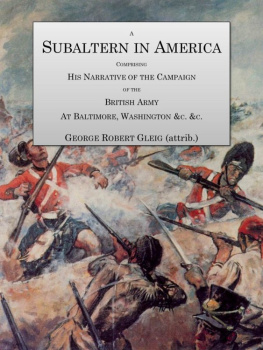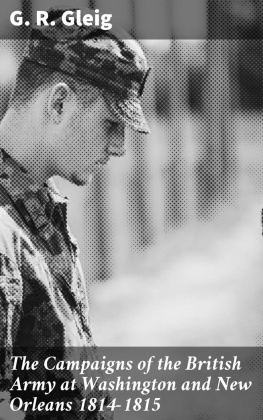Note Regarding Authorship .
This edition is from the print by E.L. Carey & A. Hart; and Allen & Ticknor, dated 1833 which is the first edition with this title:
A first-person account of an English soldiers life and career in America during the War of 1812, it was originally published in 1821 under the subtitle of this American edition (The Details of The Late War).
The work has been widely attributed (lately by Google but in the past by notable figures such as Theodore Roosevelt and Henry Adams) to George Robert Gleig, but the Anglo-American bookseller Joseph Sabin, quotes Kendric Charles Babcock as saying, in his work The Rise of American Nationality, 1811-1819, a careful examination of the volume which is not without merit makes it perfectly clear that Gleig could not have written it.
CHAPTER X.
Disembarkation in Maryland. March upon Baltimore, and death of general Ross.
The moon had set, and there was no light in the sky, except that which a multitude of brilliant stars afforded, when a general stir throughout the fleet gave notice that the moment of disembarkation was at hand. The soldiers, rousing from their sleep, began to assemble upon the decks in the order in which it had been previously agreed that they should step into the boats; the seamen, applying sedulously to their tasks, hoisted out barges, launches, gigs, &c. with all dispatch; whilst the few stores deemed essential to the operations of the campaign were so arranged, as to be transported at once from the shipping to the beach. All, however, was done in profound silence. No conversation passed from rank to rank, and even the cries of the sailors were repressed; lest being overheard by the parties which, we could not doubt, were watching us from the shore, an alarm might be communicated, and the people of Baltimore apprised of their danger.
Whilst these things were doing in the other vessels, a light gun-brig, which had weighed anchor for the purpose about an hour before, ran in with the tide; and took her station, broad-side on, within cables length of the beach. There she lay ready, in case of need, to sweep the shore with her fire. Every gun was loaded to the muzzle with grape and cannon shot. But the event proved that no opposition to the landing was contemplated. The leading boat touched the strand in safety; the soldiers contained in it sprang up the slope, and spreading themselves at extended order along the ridge, lay down. Others quickly followed, and in half an hour after the first movement had been made, a thousand men were in line, to cover the arrival of their comrades. All this took place before the first blush of dawn had shown itself in the eastern horizon. Nor was the remainder of the army tardy in reaching its destination. Exerting themselves to the utmost, our gallant tars, without any intermission of labour for several hours, pulled backwards and forwards, and by seven oclock, infantry, artillery, baggage, and horses, appeared to be all on shore.
It so happened, that the transport in which I was embarked lay very near the land, by which means our division made good its debarkation among the first; and I shall not readily forget the nature of the scene which was thus brought before me. When we gained the shore, only a single small boat, containing about twenty soldiers, had reached it. We leaped from the bow, one after another, and collecting close to the waters edge, proceeded, at a quick pace, to ascend a sloping sandbank ; at the summit of which we found our companions. The officer in command of that small party alone stood upright; the men were flat upon their bellies; but at our suggestion they rose, and advancing about forty yards farther inland, we all lay down again. Let the reader recollect, that we knew nothing of the preparations which had been made for our reception: for aught we could tell, a whole army might be in position within a stones throw of our ground; and he will not be surprised to learn, that we held our very breath, in anxious expectation of what the next instant might bring forth. Yet was the excitation very far from being disagreeable. True, we might be called upon to sustain the first shock of a force a great deal too numerous to be long opposed with success ; but we were aware, that succour would not be slow of arriving; and we could not for a moment doubt as to the final issue. Then there was much in our very position and attitude in the highest degree imposing. You could tell that troops were in line beside you, only by an occasional rustle in the long grass among which they couched; for all kept close to the earth, and not a man spoke, even in a whisper, to his nearest neighbour.
As day dawned, however, it became abundantly manifest that so much caution had been quite unnecessary; not a living creature was in sight, nor could the smallest trace that even a picquet had kept guard here, be observed. Before us lay a few open green fields, measuring, perhaps, some three hundred yards across, and then their condition furnished proof enough that neither infantry nor cavalry had traversed them. The grass waved in the breeze, undefiled by horses tread or human tramp; no track of foragers intersected it; and even upon the road, which ran a little to our right, the dust lay wholly undisturbed. In these fields the army accordingly mustered. The different regiments drew up according to their brigades; the officers took their stations, and the word was given to advance. The following is the order in which the column moved.
Major Browne, the officer who led the advance in the inroad upon Washington, having been severely wounded and left behind at Bladensburg, General Ross saw fit to dissolve the little corps altogether. Whether this arose from a feeling that there was not, in the army, another man capable of guiding it aright, I know not. All that I do know is, that in Browne he reposed the most unbounded confidencethat Browne fully deserved that confidenceand that if he changed his plan from the apprehension that there was no fit successor to him, his judgment was not very erroneous. When I say that this advance was dissolved, I mean not to affirm, that the army began its march with a front entirely uncovered. Three companies were, as formerly, pushed forward; but instead of forming a separate division, placed permanently under the command of a distinct leader, they fell, for the moment, under the guidance of the officer who chanced to be senior in rank among those attached to them. It was to that unfortunate arrangement, without doubt, that the country owed the early death of our gallant leader. After the first days march towards Washington, General Ross gave himself little or no concern about the advanced guard; he saw that the individual to whom he had intrusted it, understood his business perfectly; and to him the business was entirely left. It was not so now. Ignorant of the talents of those on whose sagacity the welfare of the whole column so much depended, the General could not keep behind; he would, in his own person, see that things were going on as he wished them to go on; and he fell in the very first skirmish.
In rear of the three companies, leaving, however, a sufficient interval between, came the light brigade, now under the command of Major Jones. Next to that corps moved a brigade of seamen, armed with muskets, and amounting to nearly a thousand men; then followed the artillery, of which eight piecessix guns, and two howitzerswere in the field; and as a sufficient number of horses to drag them had been procured, they bid fair to prove of marked utility in the enterprise. Immediately upon the artillery came the second brigade; and immediately upon the second brigade came the third. Of the exact number of combatants thus brought together, I can hardly venture to offer an opinion. We had lost at Bladensburg about five hundred men in all; but of these many were already so far convalescent as to take the field again; and our reinforcements from the fleet were considerable. Balancing the one against the other, therefore, I should be disposed to say, that somewhere about five thousand, or five thousand five hundred men, moved from the waters edge this morning.








